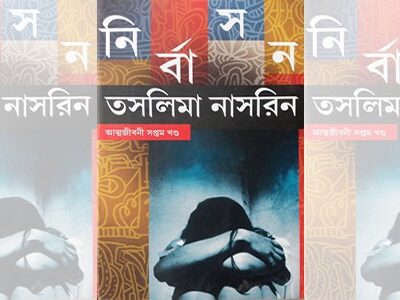Taslima Nasrin
Autobiography

Not since Salman Rushdie’s Satanic Verses has the publication of a book provoked such mob violence, public outcries for the arrest and death of the author, and international efforts to secure her safety.The animosity and bloodletting between Muslim and Hindu extremists on the Indian subcontinent is centuries old. When the Barbri Mosque at Ayodhya, India, was destroyed by Hindu fundamentalists on December 6, 1992, fierce mob reprisals took place against the Hindu minority in Muslim Bangladesh. These incidents form the backdrop for Dr. Taslima Nasrin’s explosive and courageous book, Shame, describing the nightmarish fate of one family within her country’s small Hindu community.Her book so angered Muslim leaders that a fatwa, or holy judgment, was invoked, offering thousands of dollars to anyone who would kill her. The Soldiers of Islam accused her of blasphemy and conspiracy against Islam, while the Bengali government charged her with sacrilege merely for saying that the Koran should be revised. After months in hiding, Dr. Nasrin escaped to Sweden with the aid of American, French, and European Union authorities. Her commitment to eliminating religious extremism worldwide is stated in her preface to Shame: The disease of religious fundamentalism must be fought at every turn. I will continue to write and protest persecution and discrimination. I am convinced that the only way the fundamentalist forces can be stopped is if all of us join together to fight their malignant influence. I, for one, will not be silenced.This novel has had serious repercussions for its creator. When it was published in Bangladesh, Muslim leaders in that country placed Nasrin under a fatwa or ‘holy judgment’ similar to that brought against Salman Rushdie for the Satanic Verses. -Washington PostA seething indictment of oppression and religious fundamentalism . . . -Library Journal. . . fiercely felt political novel of Bangladesh (which was a black market bestseller in India) . . . revolves around a Hindu family and its struggles in the face of retaliatory Muslim fanaticism. -Publishers Weekly



Dear,
Miss Tasleema Nasreen.
I’m Tufail Ahmad & I want intract with you regarding your book ‘Lajja’ because you ‘ve courage to fight against evil but how can it be possible where you stay and they’ll tolerate you. Your book is ‘Lajja’ not a book this is collection of data regarding & relate Indian communalwright /vs Bangladesh or other Muslim countries after when Hindu’s destroy ‘Babri Masjid’ but what you ‘ve written that is real fact there is no chance for any confusion.
Thanking you!
Regard’s
Tufail Ahmad (Manager)
Taws International Public School